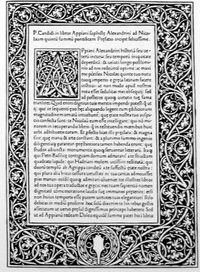آپيان
آپيان Appian Appianus Alexandrinus | |
|---|---|
| وُلِدَ | ح. 95 |
| توفي | ح. 165 |
| المهنة | مؤرخ و محامي |
آپيان من الإسكندرية (Appian ؛ /ˈæpiən/؛ باليونانية: Ἀππιανὸς Ἀλεξανδρεύς Appianòs Alexandreús؛ لاتينية: Appianus Alexandrinus؛ ح. 95 – ح. AD 165) كان مؤرخاً مصرياً-يونانياً يحمل الجنسية الرومانية وازدهر في عهود أباطرة روما تراجان، هادريان وأنطونينوس پيوس.
He was born c. 95 in Alexandria. After holding the chief offices in the province of Aegyptus (Egypt), he went to Rome c. 120, where he practised as an advocate, pleading cases before the emperors (probably as advocatus fisci).[1] It was in 147 at the earliest that he was appointed to the office of procurator, probably in Egypt, on the recommendation of his friend Marcus Cornelius Fronto, a well-known litterateur. Because the position of procurator was open only to members of the equestrian order (the "knightly" class), his possession of this office tells us about Appian's family background.
His principal surviving work (Ῥωμαϊκά Rhomaiká, known in Latin as Historia Romana and in الإنگليزية as Roman History) was written in Greek in 24 books, before 165. This work more closely resembles a series of monographs than a connected history. It gives an account of various peoples and countries from the earliest times down to their incorporation into the Roman Empire, and survives in complete books and considerable fragments.[1] The work is very valuable, especially for the period of the civil wars.[2]
الحروب الأهلية، خمسة من الكتب اللاحقة في في العمل الضخم، تعلقت أساسً بنهاية الجمهورية الرومانية وتأخذ مقاربة للتاريخ مبنية على النزاعات.
حياته
Little is known of the life of Appian of Alexandria. He wrote an autobiography that has been almost completely lost.[3] Information about Appian is distilled from his own writings and a letter[which?] by his friend Cornelius Fronto.[4] However, it is certain that Appian was born around the year AD 95 in Alexandria, the capital of Roman Egypt. Since his parents were Roman citizens capable of paying for their son's education, it can be inferred that Appian belonged to the wealthy upper classes.
It is believed that Appian moved to Rome in 120, where he became a barrister. In the introduction to his Roman History, he boasts "that he pleaded cases in Rome before the emperors." The emperors he claims to have addressed must have been either Hadrian or Marcus Aurelius and definitely Antoninus Pius, for Appian remained in Egypt at least until the end of the reign of Trajan (117). In the letter of Cornelius Fronto, it is revealed that a request on behalf of Appian to receive the rank of procurator occurred during the co-regency of Marcus Aurelius and his brother Lucius Verus between 147 and 161. Although Appian won this office, it is unclear whether it was a real job or an honorific title. The only other certain biographical datum is that Appian's Roman History appeared sometime before 162. This is one of the few primary historical sources for the period.
الأعمال

الطبعات
- Appiani Alexandrini Historia Publio Candido interprete Ac praeterea Anonymi Compendium historiae ab excessu Constantini usque ad Ioannem XXIII (in Latin). World Digital Library. Retrieved 2014-02-28.
{{cite book}}: CS1 maint: unrecognized language (link) - Editio princeps, 1551
- Schweighäuser, 1785
- Bekker, 1852
- Ludwig Mendelssohn, 1878–1905, Appiani Historia Romana, Bibliotheca Teubneriana
- Paul Goukowsky, 1997–, Appien. Histoire romaine (Greek text, French translation, notes), Collection Budé.
- Carsana, Chiara (ed.). Commento storico al libro II delle Guerre Civili di Appiano (parte I). Pisa: Edizioni ETS, 2007. 309 pp. (Pubblicazioni della Facoltà di Lettere e Filosofia dell'Università di Pavia, 116).
- الترجمات الإنگليزية
- W. B., 1578 (black letter) – possibly William Barker – used by Shakespeare
- J. D[avies], 1679
- Horace White, 1899 (Bohn's Classical Library);
- Book I edited by James Leigh Strachan-Davidson, 1902.
- Books XIII–XVII (Civil Wars), trans. John Carter, Penguin, Harmondsworth, 1996
الهامش
- ^ أ ب White, Horace (1912). "Introduction". Appian's Roman History. Cambridge, Massachusetts: The Loeb Classical Library. pp. vii–xii. ISBN 0-674-99002-1.
- ^ One or more of the preceding sentences incorporates text from a publication now in the public domain: Chisholm, Hugh, ed. (1911). . دائرة المعارف البريطانية. Vol. 2 (eleventh ed.). Cambridge University Press. pp. 221–222.
{{cite encyclopedia}}: Cite has empty unknown parameter:|coauthors=(help) - ^ Appian Proem. 62
- ^ Michael Petrus Josephus Van Den Hout, A Commentary on the Letters of M. Cornelius Fronto, Volume 190 of Mnemosyne (Brill, 1999)
المراجع
- William Smith (ed.) (1870), Dictionary of Greek and Roman Biography and Mythology, Vol. 1, pp. 247–248
وصلات خارجية
- قالب:Wikisource author-inline
- Appian's Foreign Wars at Livius.org
- Appian's Civil Wars at LacusCurtius
- Works by or about آپيان at Internet Archive
- Review of Paul Goukowsky and Phillippe Torrens, eds., Appien: Histoire romaine. Tome X, livre XV: Guerres civiles, livre III in: Bryn Mawr Classical Review.
خطأ لوا في وحدة:Authority_control على السطر 278: attempt to call field '_showMessage' (a nil value).
- مقالات المعرفة المحتوية على معلومات من دائرة المعارف البريطانية طبعة 1911
- Wikipedia articles incorporating text from the 1911 Encyclopædia Britannica
- Articles containing Ancient Greek (to 1453)-language text
- Articles containing لاتينية-language text
- Pages using Lang-xx templates
- All articles with specifically marked weasel-worded phrases
- Articles with specifically marked weasel-worded phrases from March 2012
- مواليد 95
- وفيات 165
- مؤرخو القرن الثاني
- مصريو القرن الأول
- مصريو القرن الثاني
- يونانيو القرن الأول
- يونانيو القرن الثاني
- رومان القرن الأول
- رومان القرن الثاني
- مؤرخون يونانيون في العصر الروماني
- أشخاص القرن الثاني في مصر الرومانية
- كتاب مصريون
- مؤرخون مصريون
- محامون مصريون
- اسكندريو العصر الروماني